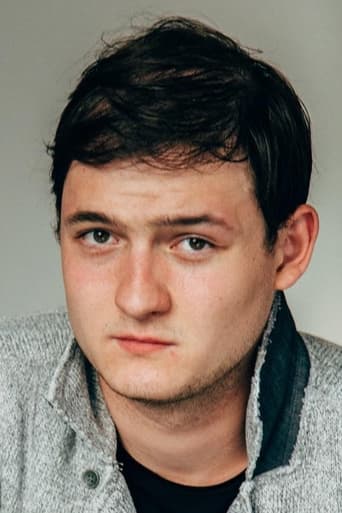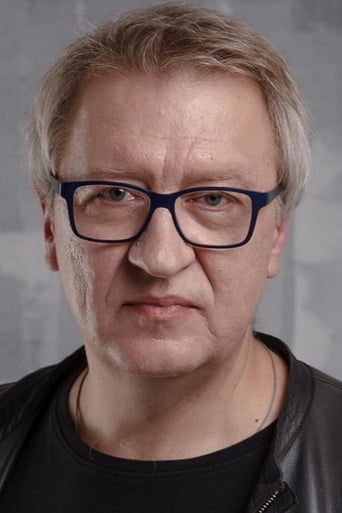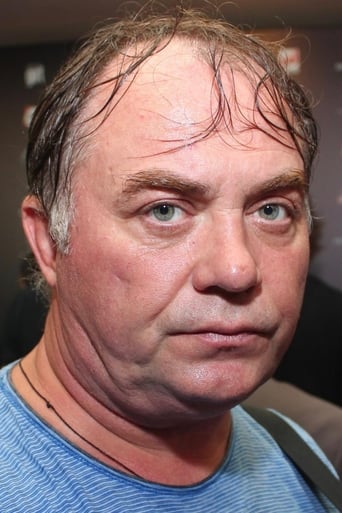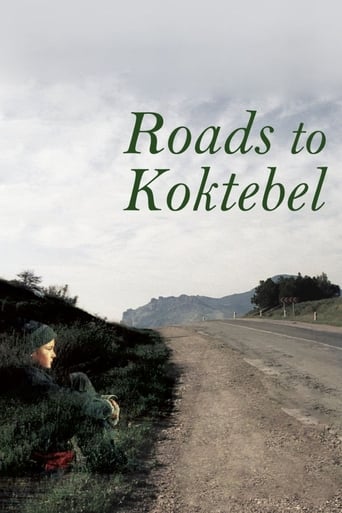
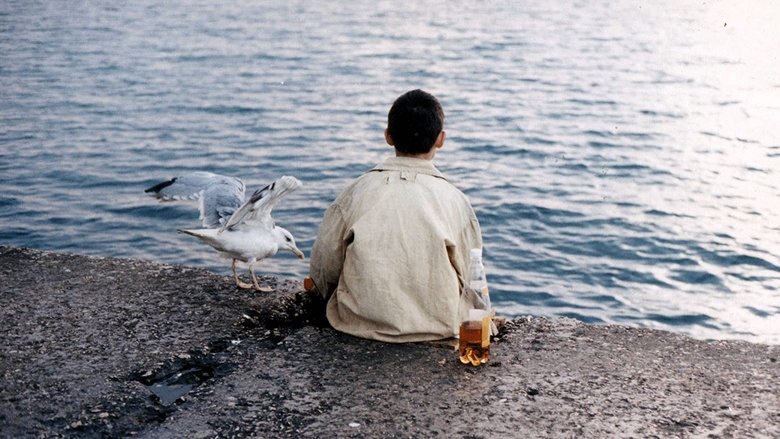
Roads to Koktebel (2003)
A widowed aeronautics engineer, who has lost his job, travels with his son hopping freight trains from Moscow to Koktebel, a town by the Black Sea, to start a new life with the father's sister.
Watch Trailer
Cast


Reviews
The father is not your quintessential hobo; he's educated and sober, so when the hobo's son points to a bird in the sky, he can name the bird(a falcon), and explain why it can fly without a constant flapping of its wings(aerodynamics). According to the father, a former engineer in Moscow, an albatross is aerodynamically superior to a falcon: wing span matters. It helps the albatross glide in an airstream. The albatross lives by the sea. This spontaneous birdwatching incident portends of a lag in their long journey, as the roads to Koktebel will be bumpy roads, when the old man's demons return to circumnavigate the engineer(Igor Csernyevics) and his son(Gleb Puskeaplis) from their goal of reaching the seaside town in Crimea. The albatross is not only a seabird; it's also a byproduct of human frailty that greatly hinders accomplishment.From the outset of the journey, in a scene aboard the train, the filmmaker privileges the boy in profile who stares at the ever-changing tableaux outside of the boxcar. Starting off at an objective distance, the stationery camera approaches the boy, until we're more intimate with the geography of his face. As the boy is being singled out for viewer sympathy, the filmmaker surreptitiously assigns blame towards the father, in due part to these found facial nuances effectuated by the maternal camera. Although the father refuses alcohol from their first benefactor near the train station, the college-educated widower reverts to full-blown alcoholism during their second major detour from the road, a tempestuous work/lodging arrangement with a drunken Stalin sympathizer. The optimism on the boy's face is a tell-tale sign of the two-fold journey(the geographical and the personal) that they're embarking on, in which the father's road to recovery encompasses the road to Koktebel.Soon after being kicked off the train by a cordial provincial train conductor, the boy finds himself staring at an outhouse while the syncopation of electronic music emanates from a small boom-box hanging on a tree. This dialectic of aggressive music and the silent countryside is suggestive of futurism, in which contemporary life, as expressed by the relatively cacophonic sounds, provide an unlikely soundtrack to the pastoral setting. Futurism proclaimed that "a roaring car that seems to be driving under shrapnel is more beautiful than the Vixtory of Samothrace". When the teenaged girl emerges from the outhouse, the boy, later in the day, demonstrates his own brand of futurism(independent of the Italian and Russian movements) when he tells the girl, "I can see everything from above," and covers his eyes with a single hand as a prelude to his flair for astral-projection. In the next scene, we see a god's-eye view of the village. Like the evoking of an albatross, futurism has a dual meaning, too; the film invokes the savage power of the machine age, in which the boy has the power to glimpse the future.Twice disappointed by his father(the drinking and the f******; the f***ee, a doctor who heals his gunshot wound at the hands of their former employer), the boy takes the road to Koktebel by himself. On a path, in the dark among the denuded trees and wild foilage, he puts another hand across his eyes, keeps it there, for a beat, then resumes his walking. Upon arriving in Koktebel, the symbolism of the birds reveals itself, as an albatross tries to steal the bread from out of the boy's possession while he sits alone on the lonely dock(the end of one, but not two journeys). He grabs the seabird by the neck, asserts control with a chokehold, before conceding to its beating wing and cry, and releases the avian machine to the sky. In the final scene, the viewer sees what was behind the boy's hand during his sojourn, another god's eye view, in which the father approaches, then sits down next to his son at the end of a pier. The meaning of this scene is unmistakable: the father, the albatross, has become the child; and the child, the father. The journey, the second journey, completes both men.
Mild spoilers.Two figures, Dad and son, wending their way across the vast Russian hinterland is a powerful metaphor for the journey one makes during one's lifetime. The characters like the landscape, are simple, unpolished and real. Even the most exacting of directors would find little to complain of from the efforts of the uniformly able cast; unforced and memorable. The assortment of folk they meet along the way (eccentrics of one kind or another), do enough to nudge the film on; the batty, vodka-sodden character in need of a new roof offering the best contribution in my view (and effects the biggest impact of all upon their journey).I would single out for special praise, the young lad (played by Gleb Puskepalis). For me, he succeeds in showing the premature transition his circumstances force him to make, from youthful innocence to adulthood; struggling with all that is brutal in our world: bereavement, betrayal, uncertainty, violence, isolation, hunger, poverty... The film offers us no reassurance that he has succeeded in coming to terms with or overcoming any of the above. Instead we learn that he is no longer the same boy; the boy obediently walking with a rucksack-eye-view behind his father, or the boy who earlier trustingly sat, accepting good humoured fatherly assistance in dealing with a worm in an apple.The film, for me, can best be summed up by one of the simple meals partaken of by father and son: crude, straightforward and honest.
One should be in a relaxed mood when going to see this film. Be there to tranquilly cherish the moments of life and the film will open itself and offer you all its hidden prizes.Someone mentioned the landscapes are bleak... The film is isomorphic to its landscapes. Bleak and lovely at the same time. Little bit depressing for those who choose to stay at a distance, to look at (film or landscapes) as at exhibits. For those who step in, it becomes precious in its touching ugliness. As you enter, ugliness is redefined. We are able to adore and love what we thought ugly before when we lived in the world bombarded by artificially selected beauty. We appreciate the naturality, the simple yet awkward reality of landscapes, of characters and of situations. The directing and actors are both excellent and succeed to achieve this reality so difficult to balance on screen!There isn't more talk than necessary, more expression of emotions or velocity of thought than a real living person would allow - not any of the tricks directors have to use to keep us interested. Yet the film is not boring. Because we can feel and understand the characters on screen as fully as we can a human being next to us! We can recognize little parts from the happening in the memories of our own life. Memories otherwise we'd never pay attention to.
MILD SPOILERSRoads to Koktebel is the story of a father and his son who travel to Koktobel in the Crimean region after a tragedy in their family. As they travel from place to place they meet many people and learn how to survive through their journey.I was expecting so much more from this film as there have been quite a lot of good reviews for the said film. Unfortunately I found the basic pacing of the film very slow and some of the scenes really were dragging and seemed disjointed. The story was ordinary which I think contributed to the nature of the film. The theme of fatherhood and family is always a good platform to make a good story. However the writers were unable to do that. I liked the performances of the actors especially the young son who was pretty good. It's a shame that the material I felt was too poor and all of his good work went down the drain.


